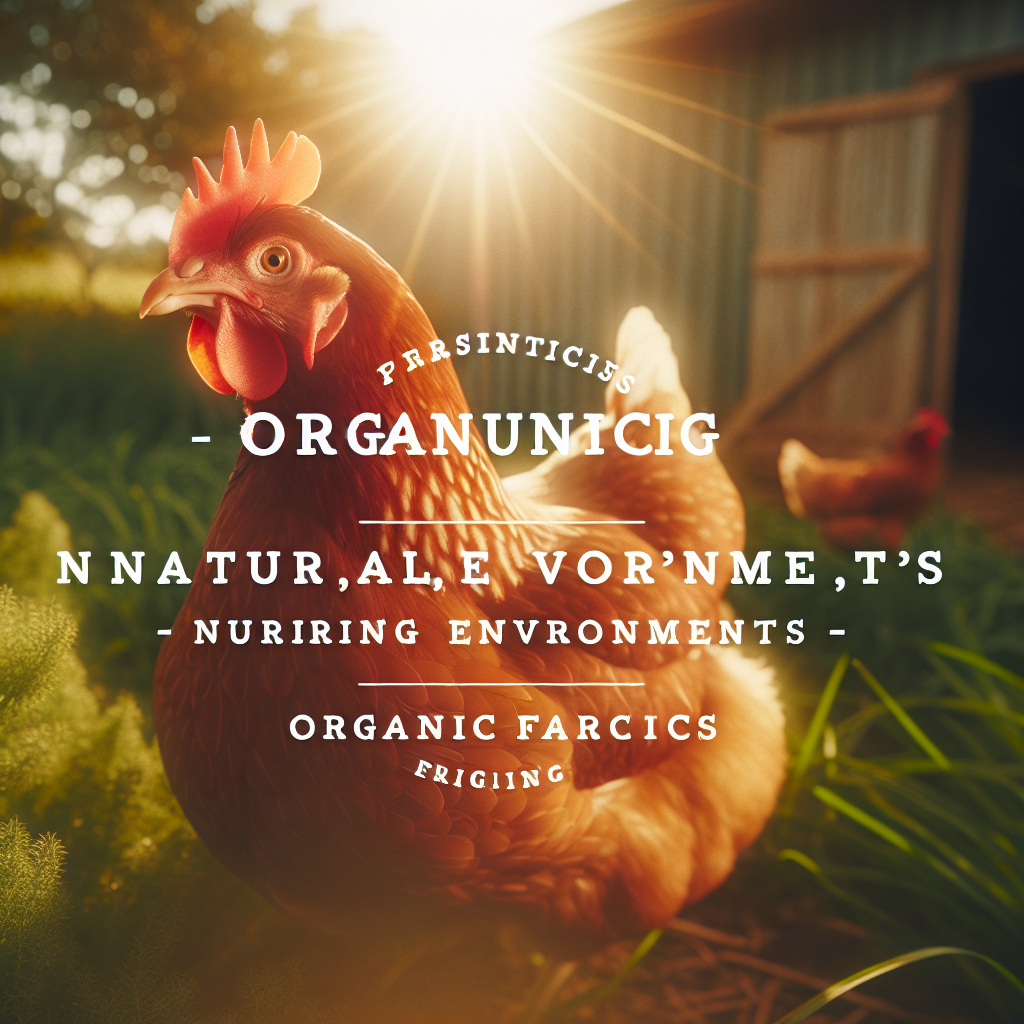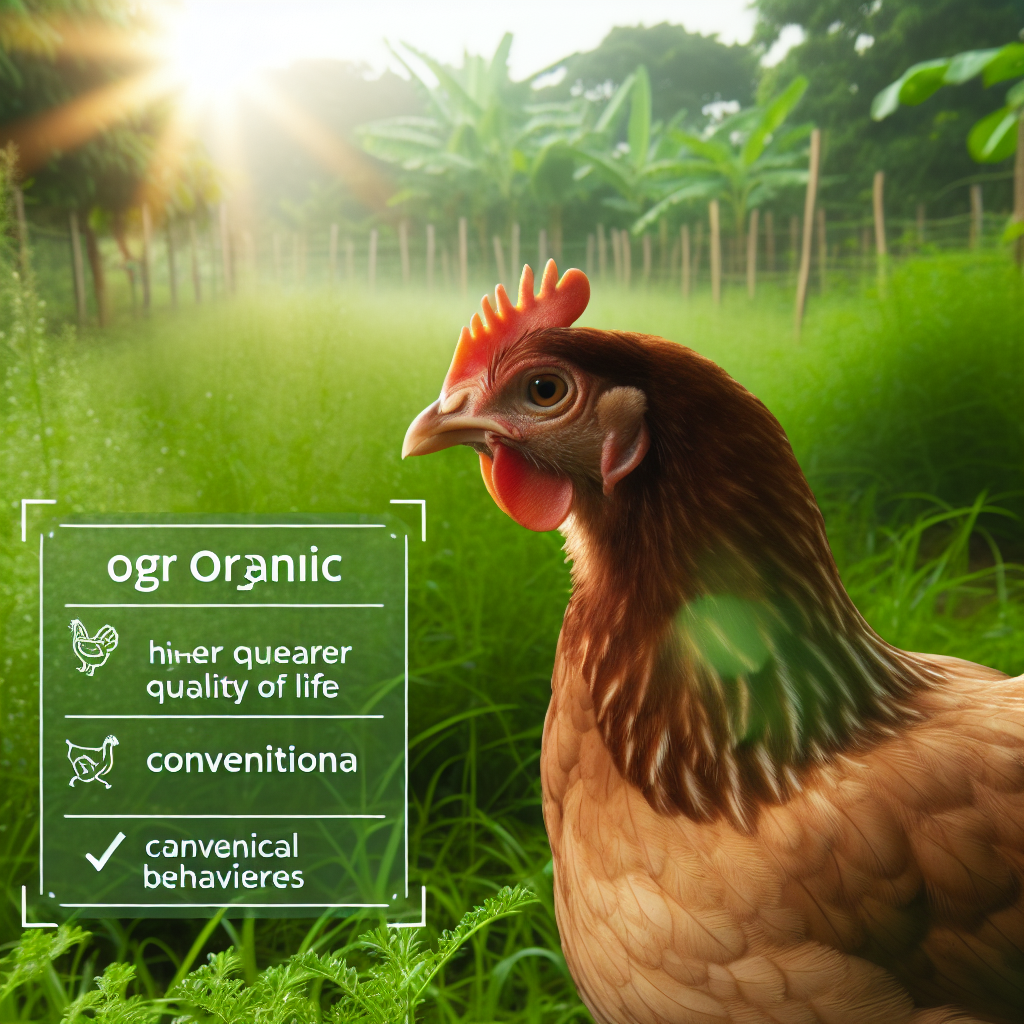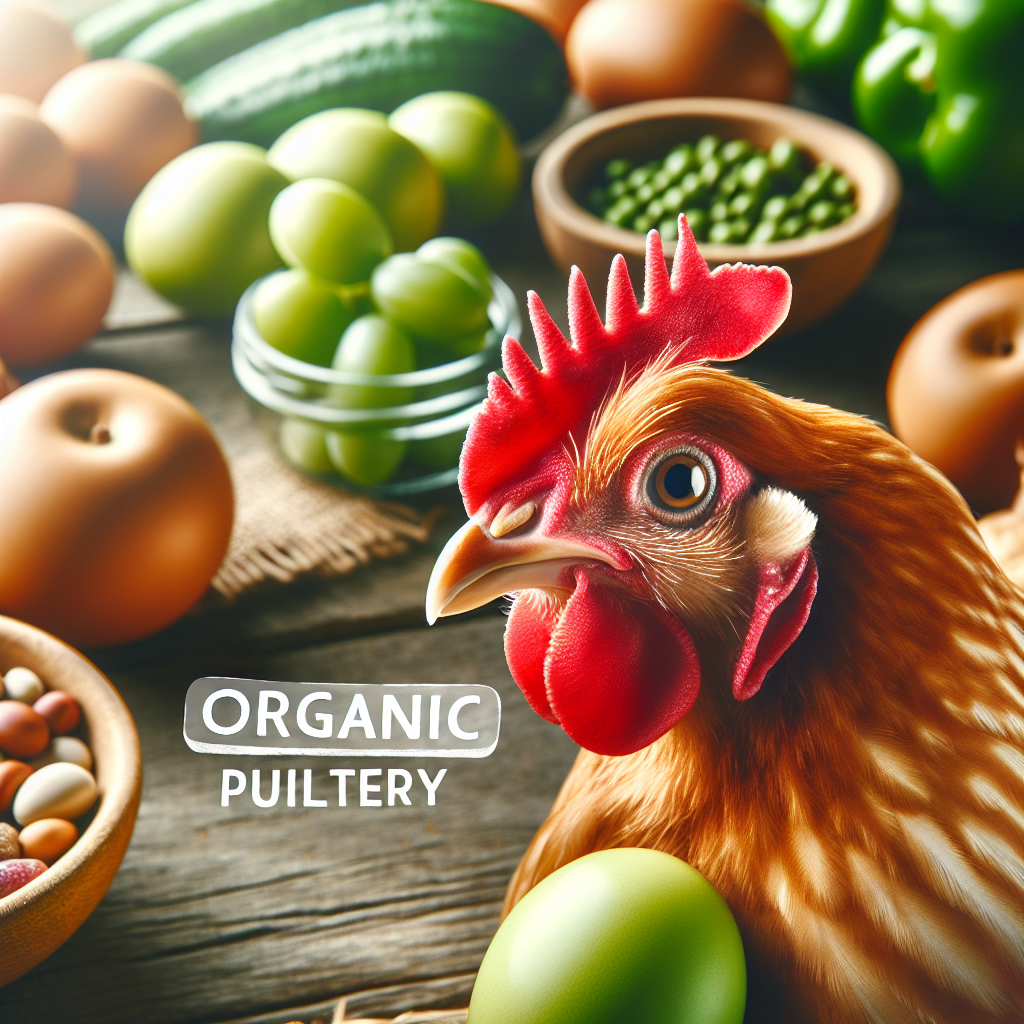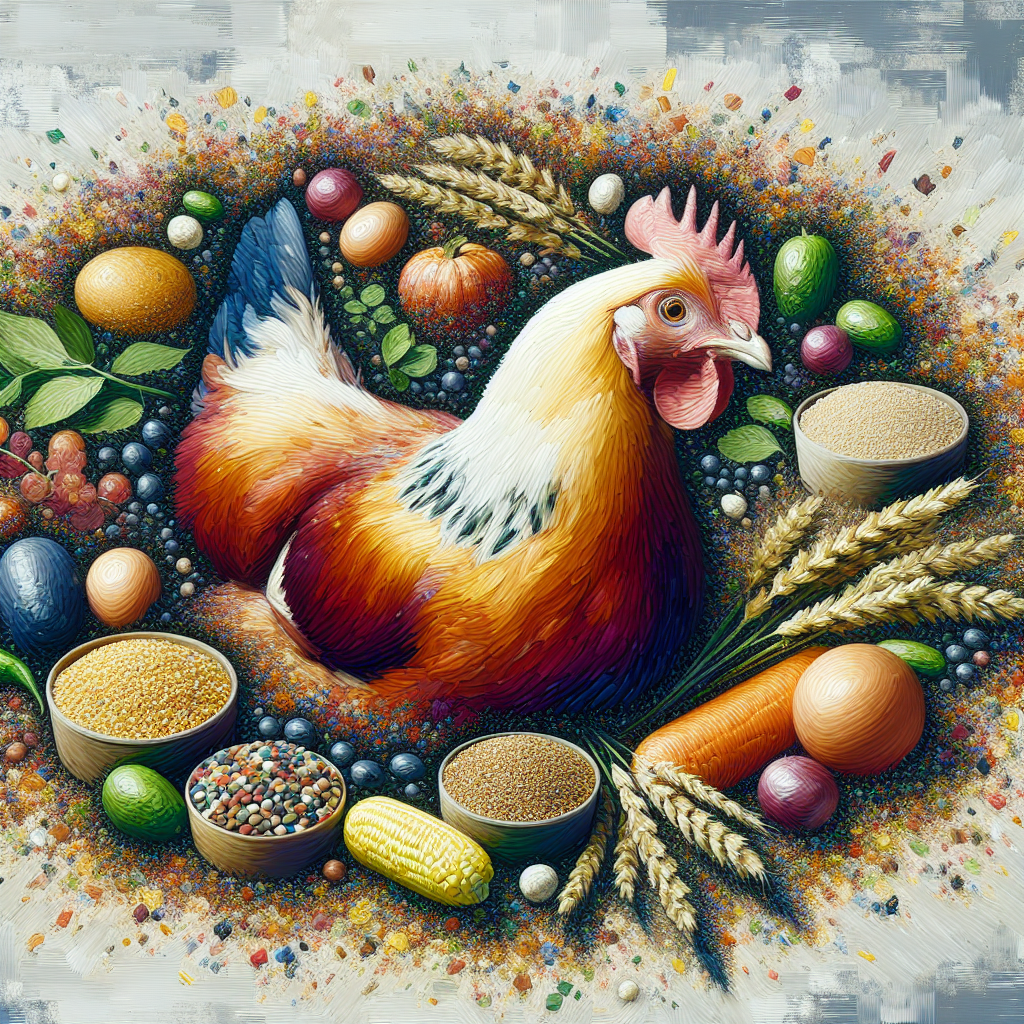Have you ever wondered how organic chicken farming affects the well-being of the chickens? Well, you’re in for a fascinating journey as we explore the impact of this farming method on the overall health and lifespan of these fine feathered creatures. Brace yourself for eye-opening insights into the nurturing environment, natural diets, and sustainable practices that contribute to the thriving existence of organic chickens. Let’s dive in and discover the secrets behind their longer and healthier lives.
Environmental Factors in Organic Chicken Farming
Outdoor Access
In organic chicken farming, one of the key factors that contribute to the overall health and well-being of the chickens is outdoor access. Unlike conventional farming methods where chickens are confined to cramped indoor spaces, organic chickens have the freedom to roam outdoors. This allows them to engage in natural behaviors such as scratching the ground, pecking at insects, and basking in the sunshine. The exposure to fresh air and natural sunlight provides essential vitamins and eliminates the risk of overcrowding, which can lead to stress and disease transmission.
Natural Diet
Another significant environmental factor in organic chicken farming is the provision of a natural diet for the chickens. Organic chickens are fed a diet that consists mainly of organic grains, seeds, and pasture. This ensures that they receive proper nutrition without the use of synthetic additives, antibiotics or growth hormones. By consuming a natural diet, organic chickens develop lean meat with higher levels of omega-3 fatty acids, essential amino acids, and antioxidants. These nutrients are not only beneficial for the health of the chickens but also for the consumers who can enjoy more nutritious and flavorful meat.
Reduced Stress Levels
Organic chicken farming aims to minimize the stress levels of the chickens throughout their lifespan. Stress can have a detrimental impact on the overall health and well-being of the animals, making them more susceptible to diseases and reducing their lifespan. In organic farming, chickens are provided with ample space to move around, interact with their flock mates, and express their natural behaviors. Additionally, stressors such as sudden changes in lighting, noise, and handling are minimized in organic chicken farming practices. By reducing stress levels, organic chicken farming promotes healthier chickens, which in turn positively impacts consumer health.
Health Benefits of Organic Chicken Farming
Lower Risk of Antibiotic Resistance
One of the major health benefits of organic chicken farming is the lower risk of antibiotic resistance. In conventional farming, antibiotics are frequently used as a preventive measure and growth promoter. However, overuse of antibiotics in livestock farming has led to the emergence of antibiotic-resistant bacteria, posing a significant threat to human health. Organic farming strictly prohibits the use of antibiotics, minimizing the chances of bacterial resistance development. As a result, consumers can enjoy poultry products that are free from harmful antibiotic residues and reduce their risk of antibiotic-resistant infections.
Improved Immune System
Organic chicken farming practices prioritize the health and well-being of the chickens by focusing on methods that boost their immune system naturally. Antibiotics and other synthetic additives that are commonly used in conventional farming may weaken the immune system of chickens, making them more vulnerable to infections and diseases. On the other hand, organic chickens are exposed to fewer stressors and given a nutritious diet, allowing their immune system to strengthen naturally. This leads to stronger and more resilient chickens that are less prone to diseases, ultimately benefiting the consumer by providing healthier meat.
Higher Nutritional Content
Organic chicken farming also offers higher nutritional content in chicken products. Due to the natural diet and outdoor access, organic chickens have access to a wider array of nutrients. Studies have shown that organic chicken meat contains higher levels of vitamins, minerals, and beneficial omega-3 fatty acids compared to conventionally farmed chicken. These nutrients not only contribute to the overall health and well-being of the chickens but also provide additional nutritional benefits to consumers. By choosing organic chicken products, consumers can ensure they are getting a more nutrient-rich source of protein.
Reduced Exposure to Chemicals
No Pesticides or Herbicides
One of the key advantages of organic chicken farming is the absence of pesticides and herbicides in the raising of chickens. In conventional farming, pesticides and herbicides are commonly used to control pests and weeds. However, these chemicals can leave residues in the chickens and their environment, posing potential health risks to both the chickens and consumers. In organic chicken farming, only natural methods are employed to manage pests and weeds, eliminating the need for harmful chemical interventions. This ensures that chickens are not exposed to toxic substances, and consumers can enjoy chicken products free from potentially harmful residues.
Avoidance of Growth Hormones
Unlike conventional farming methods, organic chicken farming strictly prohibits the use of growth hormones. Growth hormones are frequently used in conventional farming to promote rapid growth and increase meat production. However, the use of growth hormones has raised concerns about potential adverse effects on human health and the welfare of the animals. Organic chickens are reared without the influence of growth hormones, allowing them to grow at a natural and healthy pace. This not only ensures that the chickens are raised in an ethical manner but also provides consumers with chicken products that are free from artificial hormones.
Limited Use of Antibiotics
In organic chicken farming, the use of antibiotics is strictly regulated and limited. While conventional farming often relies on the routine use of antibiotics to prevent diseases and promote growth, organic chicken farming takes a different approach. Antibiotics are only administered to organic chickens when necessary to treat specific illnesses, and their use is closely monitored and regulated to ensure minimal impact on the chickens and the environment. By limiting the use of antibiotics, organic chicken farming reduces the likelihood of antibiotic residues in chicken products, which can be detrimental to human health.
Ethical Practices in Organic Chicken Farming
Humane Treatment of Chickens
Ethical practices are at the core of organic chicken farming. The welfare of the chickens is prioritized, ensuring that they are treated with respect and compassion throughout their lives. Organic chickens are provided with spacious and clean living conditions, access to the outdoors, and opportunities to engage in natural behaviors. Furthermore, organic farming practices prohibit cruel practices such as debeaking and overcrowding, which are commonly observed in conventional farming. By following these ethical guidelines, organic chicken farming promotes the overall welfare of the chickens and fosters a more humane and compassionate approach to poultry farming.
Livelihood of Local Farmers
Another aspect of ethical practices in organic chicken farming is the support it provides to local farmers and communities. Organic farming systems often involve smaller-scale, local farmers who follow sustainable and environmentally friendly practices. By choosing organic chicken products, consumers contribute to the livelihood of these farmers and help sustain local economies. Additionally, organic farming practices prioritize fair trade and a transparent supply chain, ensuring that farmers receive fair prices for their products. This ethical approach encourages a sense of community and mutual support, benefiting both the farmers and consumers.
Sustainable Farming Practices
Organic chicken farming plays a crucial role in promoting sustainable farming practices. The methods employed in organic farming strive to minimize negative impacts on the environment, such as soil degradation, water pollution, and greenhouse gas emissions. Organic chicken farming encourages ecosystem conservation by avoiding the use of synthetic chemicals that can harm biodiversity and disrupt natural ecosystems. Furthermore, organic farming promotes soil health through the use of sustainable practices such as crop rotations, composting, and natural fertilizers. By adopting sustainable practices, organic chicken farming contributes to the preservation of natural resources and the long-term sustainability of our food systems.
Impact of Organic Chicken Farming on Lifespan
Reduced Mortality Rates
One of the significant impacts of organic chicken farming on the lifespan of chickens is the reduced mortality rates compared to conventional farming. Organic chickens are provided with better living conditions, a natural diet, and reduced exposure to stressors, which contribute to their overall health and well-being. As a result, organic chickens have lower mortality rates, meaning they live longer and healthier lives. This not only benefits the welfare of the chickens but also ensures a higher quality of meat for consumers.
Lower Incidence of Diseases
By promoting better overall health, organic chicken farming reduces the incidence of diseases in chickens. The natural diet, outdoor access, and reduced exposure to stressors help boost the immune system of the chickens, making them more resilient to infections and diseases. Additionally, the limited use of antibiotics in organic farming prevents the development of antibiotic-resistant bacteria, further reducing the risk of disease outbreaks. With lower disease rates, organic chickens have a higher chance of reaching their natural lifespan, contributing to the overall well-being of the chickens and the quality of the meat.
Extended Lifespan
As a result of the improved living conditions and reduced stress levels, organic chicken farming extends the lifespan of the chickens. While conventional farming often prioritizes rapid growth and high meat production, organic chicken farming takes a more holistic approach that focuses on the health and welfare of the animals. The absence of growth hormones and the use of natural, organic diets allow the chickens to grow at a natural pace, resulting in healthier individuals with longer lifespans. This extended lifespan not only benefits the chickens themselves but also ensures the provision of high-quality and sustainable chicken products to consumers.
Comparing Life Expectancy in Organic vs Conventional Farming
Studies and Research Findings
Numerous studies have been conducted to compare the life expectancy of chickens in organic and conventional farming systems. These studies consistently show that chickens reared in organic farming environments tend to have longer lifespans compared to those raised conventionally. The improved living conditions, natural diets, and reduced exposure to stressors in organic farming contribute to the overall health and well-being of the chickens, leading to extended lifespans. Additionally, the absence of growth hormones and limited use of antibiotics further promote healthier chickens with longer life expectancies.
Factors Influencing Life Expectancy
Several factors contribute to the difference in life expectancy between organic and conventional farming. In conventional farming, the focus is often on maximizing meat production in the shortest amount of time, resulting in chickens being raised in crowded and stressful conditions. This can lead to higher stress levels, weakened immune systems, and increased susceptibility to diseases, ultimately shortening the lifespan of the chickens. On the other hand, organic farming prioritizes the welfare of the chickens, providing them with better living conditions and a more natural lifestyle. These factors contribute to the increased longevity observed in organic farming.
Consumer Health Benefits
Reduced Intake of Harmful Residues
One of the major health benefits for consumers of organic chicken products is the reduced intake of harmful residues. Conventional farming practices often involve the use of synthetic pesticides, herbicides, and antibiotics, which can leave residues in the meat and other chicken products. These residues can pose health risks to consumers, including potential adverse effects on human health and the development of antibiotic resistance. Organic chicken farming, with its strict prohibition of synthetic chemicals and limited use of antibiotics, ensures that consumers can enjoy chicken products that are free from these potentially harmful residues, promoting their overall health and well-being.
Lower Risk of Foodborne Illnesses
Organic chicken farming reduces the risk of foodborne illnesses for consumers. Conventional farming methods, with their intensive production systems, can create an environment conducive to the spread of pathogens such as Salmonella and Campylobacter. These bacteria can contaminate chicken products and cause foodborne illnesses when consumed. Organic farming, with its emphasis on proper sanitation, reduced crowding, and healthier chickens, significantly lowers the risk of foodborne illnesses. By choosing organic chicken products, consumers can have peace of mind knowing that they are consuming poultry that has been produced with strict safety measures in place.
Promotion of Overall Well-being
Consuming organic chicken products can promote overall well-being for consumers. The higher nutritional content of organic chicken meat, resulting from the natural diet and healthier chickens, provides consumers with a more nutrient-rich source of protein. This can contribute to improved overall health, a stronger immune system, and increased vitality. Additionally, the absence of synthetic additives and the reduced intake of harmful residues in organic chicken products can have positive effects on long-term health. By incorporating organic chicken products into their diets, consumers can make a conscious choice to prioritize their well-being and enjoy the numerous health benefits that organic farming offers.
Financial Implications
Higher Cost of Organic Chicken
One of the challenges associated with organic chicken farming is the higher cost compared to conventionally produced chicken. Organic farming practices often involve additional expenses such as organic feed, outdoor access provisions, and adherence to strict certification standards. These factors contribute to the higher cost of organic chicken products. However, it is important to consider that the higher cost is reflective of the increased quality and ethical practices involved in organic farming. By purchasing organic chicken products, consumers are not only investing in their own health but also supporting sustainable and ethical farming practices.
Long-term Cost-effectiveness
Although organic chicken products may come with a higher price tag initially, they can prove to be cost-effective in the long run. The emphasis on natural, sustainable farming practices in organic chicken farming reduces the reliance on synthetic inputs and promotes longevity in the farming systems. By prioritizing the overall health and welfare of the chickens, organic farming practices can minimize the occurrence of diseases and reduce the need for expensive treatments. Additionally, the improved soil and ecosystem health resulting from organic farming practices can contribute to increased productivity and long-term sustainability. These factors can ultimately translate to cost savings for farmers and potentially lead to more competitive prices for organic chicken products in the future.
Challenges and Limitations of Organic Chicken Farming
Supply and Demand
One of the challenges faced by organic chicken farming is the issue of supply and demand. As consumer awareness and demand for organic chicken products continue to grow, there is a need to ensure a consistent and reliable supply of organic chicken. Transitioning from conventional to organic farming is a complex and resource-intensive process that takes time. Organic chicken farmers need to invest in organic feed, make infrastructure modifications, and adhere to certification standards, which can create initial barriers to entry. Meeting the increasing demand for organic chicken products while maintaining the integrity and quality of organic farming practices poses a challenge for the industry.
Certification Process
Certification is another limitation and challenge in organic chicken farming. Organic farming practices must adhere to specific standards and regulations to qualify for organic certification. This requires farmers to undergo rigorous inspections, maintain detailed records, and follow specific procedures to ensure compliance with organic standards. While certification is essential to maintain credibility and transparency, the process can be time-consuming, costly, and administratively burdensome for small-scale farmers. Striking a balance between maintaining high standards and facilitating the certification process is crucial to the growth and development of organic chicken farming.
Limited Availability and Accessibility
The limited availability and accessibility of organic chicken products is another challenge facing the industry. Organic chicken farming requires specialized farming practices and certifications, which can limit the number of farmers who are able to produce organic chicken. This restricts the availability of organic chicken products in certain regions or markets. Additionally, organic chicken products may be more expensive than conventionally produced chicken, making them less accessible to lower-income consumers. Expanding the availability and accessibility of organic chicken products through education, awareness, and support for organic farmers is necessary to overcome this challenge.
Conclusion
Organic chicken farming has a significant impact on the overall health and lifespan of the chickens, as well as numerous benefits for consumers. The emphasis on environmental factors such as outdoor access and natural diets contributes to the well-being of the chickens, while the reduced exposure to chemicals ensures the production of safe and wholesome chicken products. Ethical practices in organic chicken farming prioritize the welfare of the chickens and support local farmers and sustainable farming methods. Not only does organic chicken farming extend the lifespan of the chickens, but it also provides consumer health benefits, financial implications, and promotes overall well-being. However, challenges such as supply and demand, certification processes, and limited availability and accessibility exist, and must be addressed to further the growth and development of the organic chicken farming industry. By choosing organic chicken products, consumers can make a positive impact on their own health, the welfare of the chickens, and the sustainability of our food systems.




